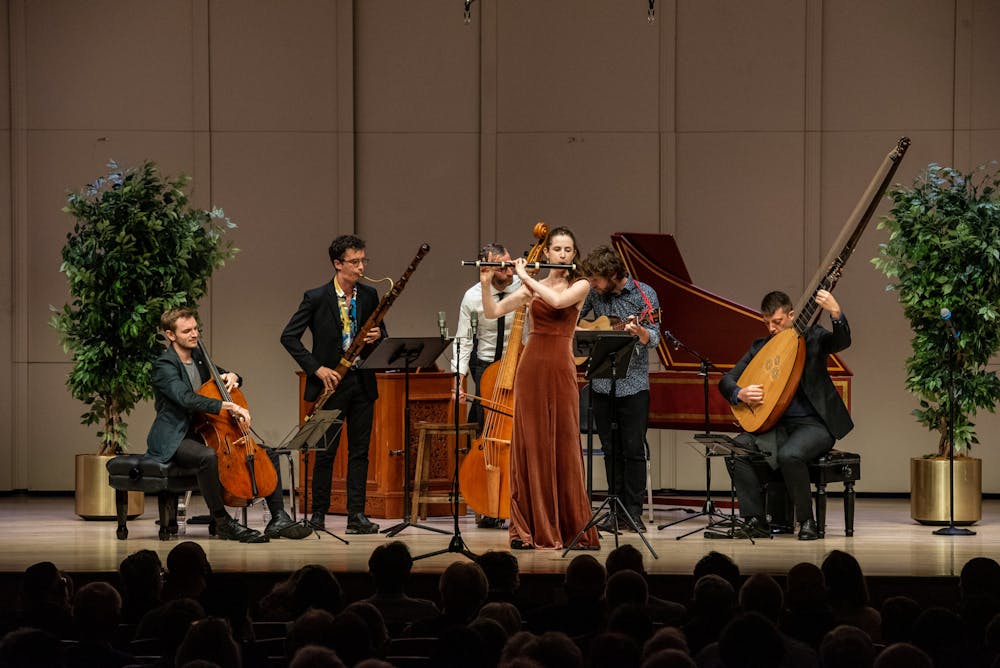The Shriver Hall Concert Series is a series of classical concerts performed by world-class musicians on campus several times per semester. On Oct. 2, the debut concert of the 2022–2023 season featured flutist Emi Ferguson performing a repertoire of Bach pieces with the Baroque ensemble Ruckus.
Emi Ferguson is an English-American flutist. She is currently a faculty member at The Julliard School. She has performed as a soloist and ensemble member in concerts and festivals all over the world.
Ruckus is a Baroque ensemble, consisting of Clay Zeller-Townson (baroque bassoon), Coleman Itzkoff (baroque cello), Doug Balliett (baroque bass), Paul Holmes Morton (baroque guitar), Adam Cockerham (theorbo) and Elliot Figg (harpsichord or organ). They are based in New York City and released their debut album Fly the Coop with Ferguson in 2019, making it to #2 on Billboard’s classical music chart.
When they came on stage, I was intrigued and surprised by the instruments they carried in. Some were a bit strange, though recognizable, and others were completely foreign to me.
The flute seemed to be made of wood rather than the normal silvery metal, while the bassoon looked to be almost entirely wood, with less visible metal keywork. The cello had no endpin and was instead squeezed between the musician’s legs to hold it up. The bass had a much shorter neck than a modern instrument, and the bow curved outwards rather than inwards. The guitar looked like a cross between a modern acoustic and a ukulele. The theorbo was completely alien, resembling an enormous lute with an extra neck stuck at the end of it.
Later, between pieces, Ferguson explained that all the instruments used in the performance were either replicas of museum pieces or originals from Bach’s time, which was about 300 years ago. The timbre or sound of the instruments we heard would be the same as those used to play the pieces when they were first composed.
To be honest about my biases coming into the concert, I’ll admit that I’ve never been a fan of Bach. He’s a composer who I’d always associated with stiff rhythm and plodding geometric forms. In my mind, his work was admittedly integral to the study of classical music, but dull to listen to, only suitable for background music in the parlors of 18th-century aristocrats.
However, on that cold and drizzly Sunday evening, the Shriver auditorium was the coziest and liveliest place on campus. With a sharp intake of breath from Ferguson, the musicians launched into a jaunty rendition of “Prelude in G major, after BWV 884.” The sound of the instruments was strangely muted, even though I was sitting in only the 10th row, but also incredibly warm and alive.
Immediately, I could feel that the musicians imbued the piece with a sense of life and freedom, certainly not what I’d expected to hear from a Bach Prelude. This was music that demanded attention. I saw some heads bobbing to the beat in the audience, everyone utterly taken by the music.
The musicians were constantly swaying and exchanging meaningful looks, completely connected in the music. The sound easily shifted between severity and joy, taking the audience through unexpected changes in emotion. At times, they embodied such urgency and tension that I held my breath. Then in a moment they could switch to utter joy, airy and resonant.
Ferguson’s playing was exceptionally warm and ethereal. It never demanded too much attention in the pieces, always perfectly balanced with the Ruckus ensemble, weaving the melody through and behind the other parts.
The music also had a wonderfully folksy quality. At times, it felt as if they were having a fun jam session rather than a formal classical music concert. This was Bach, alive and breathing in front of us.
In between sections, Ferguson and ensemble members gave explanations about and interpretations of the pieces. They explained that the pieces were written in two parts, having a melody and bass line. The bass line was the same for each member of the Ruckus ensemble, like a lead sheet in jazz, but they were free to improvise on it.
They mentioned how they constantly surprised each other with their improvisations, even in the middle of the performance. This contributed to that folk music impression that I’d gotten earlier – they were literally making up some of the music as they went along.
One of the most stunning moments in the concert was the flute solo at the end of the penultimate piece. All the other players dropped out, and it was just Ferguson alone with her flute. I heard two tones being played at once, the flute and what sounded like a low woman’s hum in the background.
Confused, I looked for the source of the humming sound, thinking it might have been the bassoonist. However, after a few seconds, I realized that Ferguson was actually playing both notes at once. It was one of the most impressive musical feats I’d ever witnessed. She was duetting with herself!
This concert completely reversed my long-held prejudices against Bach and Baroque music in general. It was fantastic. Every piece was beautifully articulated, and I could feel their vibrancy.
Incredible professional musicians play concerts right on our campus, yet everyone seemed to be spending their Sunday night studying in Brody instead. So consider this article the sign you’ve been waiting for. Take a chance on classical music and take this opportunity to watch it live! I guarantee you won’t regret it.





